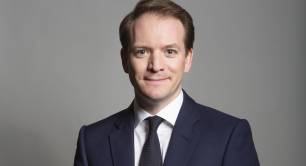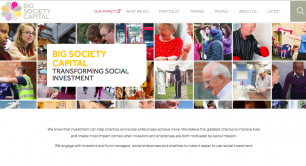Big Society Capital CEO: ‘We want to double UK social investment – but we can't do it alone’
The UK’s Big Society Capital has just published a strategy “refresh”, announcing a new target to double social investment flows by 2025. CEO Stephen Muers tells Pioneers Post why that requires going beyond the “small and fiddly” investments, why accessing dormant asset money isn’t part of the plan, and why recent criticisms are not a reason to change course – even if they do keep the institution “on its toes”.
In a four-page strategy published yesterday, Big Society Capital says it aims to at least double the capital going into UK social investment, to between £10bn and £15bn by 2025. To achieve this, the organisation is not implementing any radical changes, but plans to “double down on what works”, including leveraging more funding towards social and affordable housing, social lending and impact ventures, and increasing the use of social outcomes contracts (also known as social impact bonds, where impact investors cover the costs of a provider delivering a service, and are repaid by public authorities if positive outcomes are achieved).
But the social investment wholesaler can’t do it alone and needs more individuals, institutional investors, philanthropists and public sector investors to get involved, says CEO Stephen Muers. In his first interview with Pioneers Post since he was appointed to the role in April, he tells us how he plans to make this happen, sets out his long-term view for the organisation – and explains why diversity is not mentioned at all in the new strategy.
Pioneers Post: You say you want to at least double the money going into social investment by 2025. How are you going to do that?
Stephen Muers: A lot of it is about building platforms for other people to invest in, because we're not going to get to that scale with BSC's capital alone – with the money we've got we're not suddenly going to double in size. So we've got to make it easy for other people to invest in social impact.
We started doing that last year with the Schroder BSC Social Impact Trust [a £75m publicly-listed trust launched last December]. We have the ambition to take it to several times its current size, looking to get into the £200m to £300m bracket by 2025.
Then we're looking at other kinds of platforms where people can invest alongside us, whether that's fund vehicles in certain segments, or whether it’s BSC aggregating investments so that it's easier for other investors to buy larger chunks into those.
One of the barriers in the past has often been that social impact investments were a bit small and a bit fiddly for some investors. So part of our job is to make it easier for individuals, institutional investors, philanthropists, even the public sector in some cases, to invest in social impact. We’re not going to double the size on our own.
This strategy is about taking what we've learned – and not everything we've done has worked in the past – so we have a real opportunity to be ambitious in the future. What we're going to try and do in the next period is really focus more on the kinds of investments and areas of the market where we see real momentum.
In the past social impact investments were a bit small and a bit fiddly for some investors. Part of our job is to make it easier
PP: BSC is facing criticism from various sides – last week, Conservative MP Gareth Davies said in a report that BSC was “operationally suboptimal” and didn’t focus enough on “picking winners”; others, for example, say the cost of capital is too high and creates a barrier for businesses to take on social investment. What’s your reaction to this?
SM: I'm really pleased that people are writing reports about social investment and about Big Society Capital… because it shows that it matters, that people care about it. I'm also very pleased that we're getting different perspectives from different people that are challenging us from different sides, because that keeps us on our toes, that keeps us accountable. That's a good thing.
On the cost of capital question, we are involved in a lot of initiatives that help to address some of these barriers, such as the the Growth Fund that we operate with Access [a blended finance programme that uses subsidy funding alongside loans], and the Resilience and Recovery Loan Fund we put in place during the Covid pandemic, that uses government guarantees to help bring down the cost of capital.
About the Gareth Davies report, I agree with him about a lot of things, like his ambition for how this sector can help achieve big changes in the UK that really matter.
There are other things that I don't quite agree with – his criticism around social outcomes contracts are slightly missing the point about why those haven't taken off.
PP: When it launched in 2012, Big Society Capital was given £425m from dormant bank accounts to kickstart the social investment market. New legislation is currently going through parliament that will unlock an estimated £880m to be invested in “good causes”. The government hasn’t yet specified who it would go to. Is it a priority for you as CEO to secure this money?
SM: Our plans do not require us to receive more dormant accounts money. Even if we don't receive any more money, we believe we can reach the ambitious targets [outlined in our strategy].
Now, I will be having a dialogue with the government about how we could put dormant assets to good use, and we might be supporting others in the sector who also could use dormant assets in effective ways. I already work closely with Access, with Fair4All Finance and the Youth Futures Foundation, the other [current] recipients of dormant assets, and those can be the bodies that can make the best best use of this. It's not essential for us at BSC.
PP: When BSC was founded, you had a very supportive government. But earlier this year, Nick Hurd – who oversaw the birth of Big Society Capital as civil society minister – said that Whitehall nowadays neither “gets the social economy” nor does it see it as a “valued partner”. How did you get there?
SM: I think a few things happened along the way. We're on our third prime minister, we've had Brexit, we've had about three general elections, there's been quite a lot of water under a lot of political bridges.
[Nick Hurd] is right, the social economy should be more at the heart of what the government is trying to do. And Nick and I and others are doing our best to get in there.
But equally, there are bits of government that have seen what we can do, and actually put their money where their mouth is, such as the joint initiative we recently did with the Ministry of Housing, Communities and Local Government where they invested £15m alongside our £15m to house people who would otherwise be on the streets. We also work with local authorities, for example Greater Manchester Combined Authority and the Greater London Authority that have also invested in funds that we've been working with.
My experience working with the government is that the first step – the first time you do something new and different – is often the hardest bit. All the barriers, all the bureaucratic fear of something that's risky come down once you do it once, and show that it works.
In some bigger and more commercial types of social property funds, we're trying to tilt their practice towards impact
PP: The 2025 strategy highlights your investments in social property funds, which many say are rather safe investments. Billions are already going to affordable housing through mainstream finance, so how is BSC investment making more of a difference than a conventional loan?
SM: Before saying that our investment in housing is safe, if you talk to some of our fund managers you will see that what they’re doing is not very safe. For example the WISH [women in safe homes] fund, which funds charities that are providing housing for vulnerable women: that is not a sector that's funded well by the mainstream. We're trying to reach groups of people that get missed out by the mainstream.
We are also investing in some bigger and more commercial types of social property funds. What we're doing there is we're trying to tilt their practice towards impact. If it is a very large fund, by putting in a small amount of money, BSC can affect the way they look at impact and the depth to which they measure it, how they treat their tenants, how they assess impact in their portfolio.
PP: The social investment sector has been accused of not being inclusive or diverse enough, and BSC often says addressing this is a priority. But diversity is not mentioned even once in the strategy summary – why is that?
SM: We've recently developed, internally, a new diversity and inclusion action plan, which we will be publishing reasonably soon, as one of our many follow-up pieces to this strategy. There will be several detailed pieces coming out of the back of the summary material, and one of those will be specifically addressing diversity and inclusion.
In terms of the targets we're setting ourselves around 2025, we will be initially not just looking at the scale of the markets, but also at the reach of the market – how social investment is reaching different geographies, different communities, different groups who haven't always been able to access it in the past. That's something that we will be explicitly looking at. It's very much something that's central to what we're trying to do, really important to us. There's a lot of work we're doing in that space across a whole range of different elements.
The thing I really want is for social impact investment to really prove its worth, to come into the mainstream
PP: If you're doing all this work, why is it not mentioned in the strategy summary?
SM: There's an awful lot of things we're doing that we don't mention in the strategy. We're trying to present the very, very top level summary.
PP: So diversity and inclusion are not at the top level of your priorities...
SM: No, that's not what I mean, I would say, when you try and sum up our five-year strategy in a very short piece… it's not going to be boiled down to those few words.
PP: What is your personal ambition as Big Society Capital CEO? Something you’d like to achieve?
SM: The thing I really want is our movement, social impact investment, to really prove its worth, come into the mainstream and really make a difference on big issues.
I think we've tried lots of things and shown that a lot of things work. But there's something about getting it from being a good thing, to being a good thing that really moves the dial and makes a difference, so that we, at BSC, are doing our part in the big conversation about change actually happening. I think we're at a point now where we can get to that. I think that's the next stage.
Interview edited for length and clarity.
Thanks for reading our stories. As an entrepreneur or investor yourself, you'll know that producing quality work doesn't come free. We rely on our subscribers to sustain our journalism – so if you think it's worth having an independent, specialist media platform that covers social enterprise stories, please consider subscribing. You'll also be buying social: Pioneers Post is a social enterprise itself, reinvesting all our profits into helping you do good business, better.



